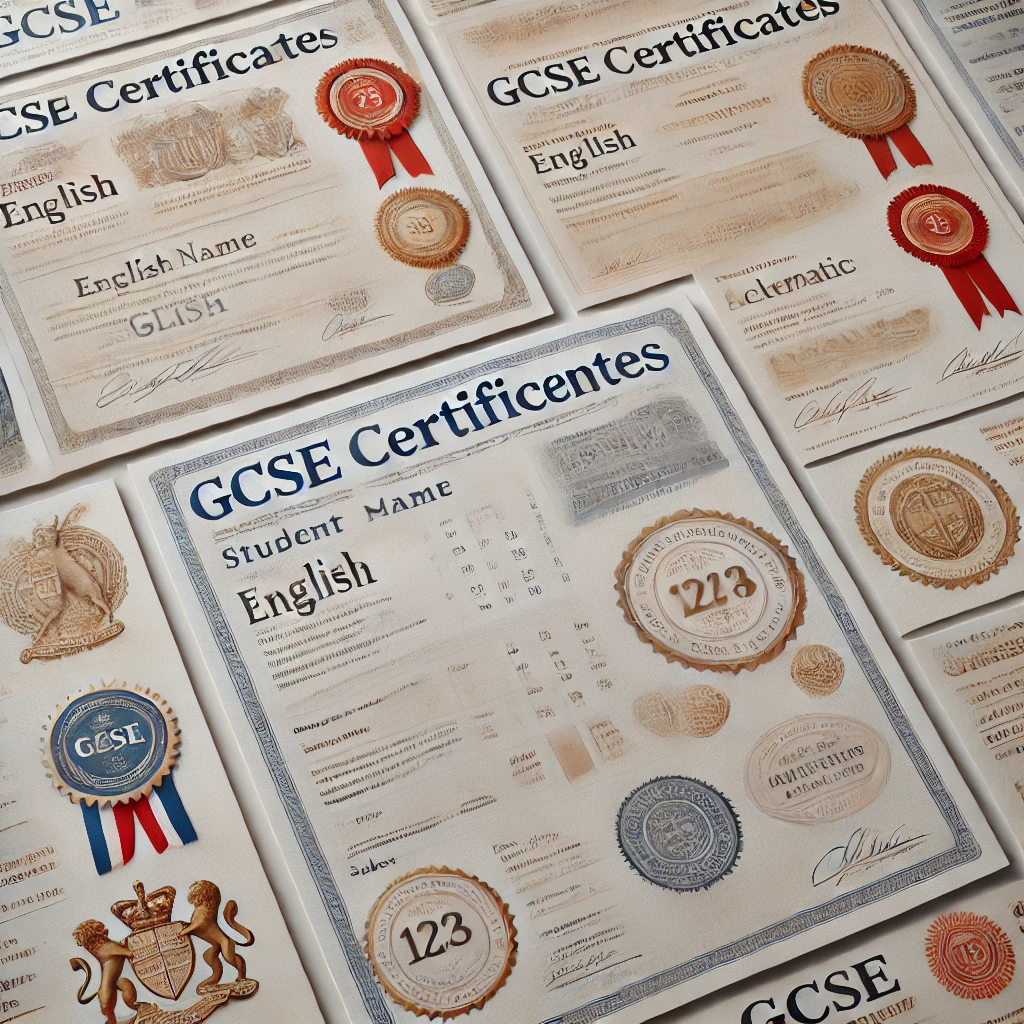GCSE Remark Guide: Deadlines, Costs & How It Works
Did you know that 1 in 5 GCSE grades that are challenged end up increasing every year? That’s because everyone, even examiners, can make mistakes. Whether you already received your GCSE grade and want to improve or just want to learn about GCSE remark procedure ahead of time to be ready, this blog is for you! If you’re still awaiting your results, preparing for GCSE results day can help you approach the remarking process with more confidence if needed.
Key Takeaways
- Students can request a GCSE remark for 30 days after the GCSE results day.
- It’s better to consult with a teacher if it’s worth it or not.
- Sometimes, grades might get lowered.
- Remarking one exam paper costs around £35.
- Remarking can take up from 3 days to 3 weeks or sometimes, more.
- If GCSE remarking is not successful, students can resit their GCSEs.
How long does a gcse remark take?
What is the GCSE Remark?
A GCSE remark is a process of requesting a review of a GCSE grade assigned by an exam board. The process is usually initiated by the secondary school student or their parents, who believe that their grade is an unfair representation of what they demonstrated in the exam. The process involves several steps, including contacting the secondary school, which then contacts the exam board to request a review of marking. Before proceeding with a remark, you’ll need to have access to your examination details.
How much does a GCSE Remark Take?
The GCSE remark process usually takes between one and four weeks, depending on the exam board and the type of review you request. A priority GCSE remark is quicker and is mainly used when a student’s university or sixth-form place depends on the result. Standard reviews take a little longer because examiners need time to re-check the marking in detail.
The time needed to process a GCSE remark varies slightly between AQA, Edexcel, OCR and other boards, but most students receive their remark outcome within the published GCSE remark deadlines each year. If the exam board needs to review multiple papers or complete a full accuracy check, the process may take slightly longer.
Because the waiting period can feel stressful, it’s helpful to plan ahead. Keep an eye on your exam board’s official GCSE remark timeline so you know when to expect updates, especially if you’re also planning GCSE resits or considering alternative sixth-form options.
How Much Does a GCSE Remark Cost?
The GCSE remark cost varies depending on the exam board:
| Exam Board | Price Per Paper |
| AQA | £38.35 |
| OCR | Clerical re-check – £11 Second review of marking – £57.50 A copy of the reviewed script – £14.75 |
| Pearson Edexcel | Clerical re-check – £11.90 |
GCSE Remarking with AQA
AQA GCSE remark is £38.35 per paper. If your overall grade for a subject improves as a result, AQA will reimburse the fee for all papers in that subject. If, however, your grade only improves on one paper and you still fail to reach the grade boundary, you will only be reimbursed for the fee of that one re-graded paper.
GCSE Remarking with OCR
For OCR, there are several options for remarking. One is a clerical re-check which makes sure that all the pages were marked and summed up correctly. This costs £11. The second review of marking checks whether the mark scheme was applied correctly. This costs £57.50 per paper. A copy of the reviewed script costs £14.75.
GCSE Remarking with Edexcel
For Edexcel, a clerical re-check costs £11.90. a Full remarking costs £42.40. Edexcel priority remarking fee costs £48.70.
Please note that if you want to remark multiple papers, such as an entire GCSE maths examination, the cost could add up. Therefore, it’s always a good idea to consult with your teacher before submitting your grades for a remark to determine the best course of action.
If your grade is raised as a result of a remark GCSE, the examination board will refund the cost of the remark. However, if your grade remains the same or is lowered, you will not be reimbursed for the cost of the remark.
How Much Time Does a GCSE Remark Take?
The time it takes for a GCSE remark to be processed can vary depending on the examination board.
| Exam Board | Time it Takes to Get a GCSE Paper Remarked |
| AQA | 10-20 days |
| OCR | Up to 20 days |
| Pearson Edexcel | Can take up to 3 Weeks |
Please note that these are just rough estimates and the actual time it takes may depend on various factors such as the workload of the examination board and the number of papers that were appealed at the same time. Therefore, it’s always a good idea to consult with your teacher or the examination board to get a more accurate estimate of the time it will take for your GCSE remark to be processed.
GCSE success rate: Should You Appeal Your GCSE Grades?
Whether a GCSE remark is worth it or not depends on several factors:
💰 GCSE Remarking Can Get Expensive
The cost of a GCSE remark can add up, especially if you’re remarking multiple papers. It would help if you weighed the cost against the potential benefits of a grade change.
⚠️ You’re Not Guaranteed that Your GCSE Grade Will Change
If you’re close to the upper side of the grade boundary, a remark might be worth it, as there’s a chance that your grade could be raised. However, if you’re closer to the lower side, there’s a risk that your grade could be lowered.
🕒 GCSE Remarking Process Can Take Time
A remark GCSE can take time to complete, and this could be an obstacle to your registration for the sixth form. If you’re considering a GCSE remark, you need to consider the time it will take and whether it will impact plans for A-levels.
Actually, in 2022, 46’810 students were awarded grade 3 (“fail”) in error.
Additionally, Pearson faced a record-breaking fine of £1.35 million and was ordered to pay £320,000 in compensation to schools and colleges. This was for allowing examiners to grade their work and for issuing incorrect certificates between 2016 and 2019. Ofqual found Pearson to violate rules and the fine is the largest ever imposed by the regulator. Pearson accepted its failings and agreed to compensate affected schools and colleges.
These are some examples of why it might be worth trying. However, make sure to double-check with your teacher so that you don’t lose extra money or time.
How to get GCSE remarked in 2025?
To request a GCSE remark in 2025, discuss with your teacher if your results seem off. Understand the remark types: clerical checks and marking reviews. Request through your school, noting fees and deadlines. Results can change, affecting future plans. Further appeals are possible if dissatisfied with the outcome.
To get a GCSE exam paper remarked in 2025, follow these steps:
- Discuss with Your Teacher: Before initiating a remark, talk to your teacher or tutor to assess whether a remark is advisable based on your expected performance and the marks received.
- Understand the Types of Review: Know the difference between a clerical check (which verifies marks have been added correctly) and a review of marking (a full recheck of the examiner’s marking).
- Check Deadlines and Fees: Contact your school or examination centre to find out the deadlines for requesting a remark and the associated fees. This information can typically be found on the exam board’s website or through direct enquiry at your school.
- Request a Remark: Your school or examination centre will need to submit the request for a remark on your behalf. You’ll need to provide your consent and possibly pay a fee, which may be refunded if your grade changes as a result of the remark.
- Await the Outcome: The review process can take several weeks, especially during busy periods. Be patient and prepare for any potential impact on your future plans, such as college applications.
- Consider Further Appeals: If you are dissatisfied with the outcome of the remark, ask about the possibility of further appeals. This might involve a more detailed investigation into how the examination was marked.
- Plan for Different Outcomes: Understand that the remark can lead to a grade being raised, lowered, or remaining the same, so consider all possibilities and their implications for your next steps.
It’s important to act quickly once results are released, as there are strict deadlines for requesting remarks. Also, ensure that any decisions are well-informed and consider both the potential benefits and risks.
The Deadline for Remarking your GCSE Grade

The deadline for requesting a GCSE remark is typically within 30 days of the results being published. It’s important to note that this deadline may vary depending on the examination board. Hence, it’s always best to check for the most up-to-date information. It’s also a good idea to submit your request for a remark as soon as possible! This ensures you don’t miss the deadline and won’t delay your registration to a sixth form.
What If Your GCSE Marks Don’t Change?
If your GCSE marks do not change as a result of a remark, you can resit the GCSE exam in November or the following year. This gives you another opportunity to improve your grade.
One year after taking your GCSEs, you can resit all the GCSE subjects for free. Additionally, if you are under 19, you are legally required to resit GCSE English and GCSE maths to obtain a grade of 4 or above.
For those pondering over the implications of unsuccessful GCSE mocks, understanding the next steps is crucial. If you’re concerned about your child’s performance in their GCSE mocks, our detailed guide, What to do if your child fails their GCSE mocks, offers comprehensive advice on how to navigate this challenging scenario.
If you have already begun your education in sixth form or college and need to retake some GCSE exams, you can choose to study the subjects alongside your A-Level or BTEC courses. This is a good option if you only need to retake a few subjects. However, if you need to resit more than two subjects, it may be beneficial to postpone your A-Level studies to ensure you can manage the workload effectively.
How Much Do GCSE Resits Cost?
The cost of resitting a GCSE exam usually stands at around £35 per paper, however, this only applies to resits taken voluntarily. If you are required to retake GCSE English or Maths, these can be done free of charge at a local college.
For those who prefer a different environment for their resits, becoming a private candidate can provide more flexibility. However, keep in mind that registering as a private candidate isn’t free. The fees for this can add up quickly, especially if you require a full year of tuition. The cost could range from several hundred to over £1000, so it’s wise to factor in the expenses when making your decision.
What Happens If Your Grades Stay the Same After a GCSE Resit?
The GCSE remark success rate is approximately 20%, but if your grades don’t improve after a GCSE resit, you have the option to retake the exam multiple times. There’s no cap on the number of retakes you can attempt; however, it’s vital to think about how you manage your time and finances. Investing more time and effort effectively could help you minimize the need for, and cost of, further resits.
It’s worth noting that if you receive a lower grade on a resit, the exam board will disregard the resit score and your certificate will display the original, higher grade.
What to Do If Your Grade Changes?
If your GCSE grade changes as a result of a remark, there are several important steps to take. First, inform your school or college immediately so they can update their records. If you’ve already applied to sixth form or college with your original grades, contact their admissions office right away with proof of your new grade. They’ll need this information to confirm your place, especially if the new grade now meets their entry requirements.
It’s also worth keeping physical copies of both your original certificates and the updated ones, as you may need to show both during future applications. Remember that a grade increase means you’ll receive a refund for the remark fee, which should be processed automatically through your school.
Final Advice
Don’t worry if your GCSE results don’t turn out as you hoped or if your remark was unsuccessful. This happens to many students every year and there can be various reasons, such as exam anxiety.
To make the most out of your revision, utilise past papers and various free GCSE revision resources online.
It’s reported that 20% of appealed GCSE grades end up being raised. So, if your teacher recommends it, go for it! If not, you always have the option to retake your GCSEs while pursuing A-levels. Remember that different sixth forms have varying entrance requirements and some may require specific GCSE grades. So, be sure to choose wisely!
FAQs:
What is a GCSE remark?
A GCSE remark is a review process where an exam board checks your exam paper again to verify the marking accuracy.
Do you have to pay to get GCSE remarked?
Yes, you generally have to pay a fee to have a GCSE exam paper remarked. This fee varies depending on the exam board and the type of review requested. If the remark results in a change in your grade (either up or down), most exam boards will refund the fee. It’s important to consult with your school or the relevant exam board for the specific costs and procedures related to remarking GCSE papers.
How much does it cost to appeal a GCSE?
The cost of appealing a GCSE result can vary depending on the exam board and the specific type of appeal or review you are requesting. Each exam board has its own set of fees for different services, such as clerical checks, reviews of marking, or appeals.
Generally, the fees might range from £20 to £60 for a clerical check, and from £30 to over £100 for a review of marking. If the appeal leads to a grade change, these fees are usually refunded. It’s best to check directly with the exam board or through your school to get the most accurate and up-to-date information regarding the costs associated with appealing a GCSE result.
Can a GCSE grade go down after a remark?
Yes, a GCSE grade can go down after a remark. The examiner might find errors in your favour, but they could also discover that you were awarded too many marks initially. Consult with your teacher before requesting a remark to assess this risk based on how close you are to grade boundaries.
Is it worth getting GCSE remarks?
Deciding whether to get a GCSE remark depends on several factors:
- Marginal Grades: If your grade is just below a boundary that’s critical for your future plans (like entry requirements for further education), it might be worth considering a remark.
- University or Sixth Form Requirements: If a specific grade is needed to meet conditional offers for universities or sixth form colleges, and your score is very close to the threshold, a remark could potentially change the outcome.
- Teacher Feedback: Consult with your teachers who can provide insight based on their knowledge of your work and performance throughout the course. If they believe your marked grade is significantly out of step with what was expected, a remark might be justified.
- Cost and Potential Refund: Be aware of the costs involved and understand that fees are typically refunded only if the grade changes.
- Risk of Grade Change: Remember that grades can go down as well as up. Ensure you understand the implications of a lower grade if the remark does not go in your favour.
- Timing: Consider the time it takes to process a remark. This could impact your application processes or any deadlines you need to meet.
Overall, it’s worth getting a GCSE remark if you strongly believe there has been an error in the marking and the potential benefits of a grade change outweigh the costs and risks involved.
What is the deadline for appealing GCSE grade?
The deadline for appealing GCSE grades can vary by examination board and the type of appeal or review you’re requesting. Generally, there are two main stages for appealing:
- Review of Marking: This initial stage must usually be requested within a few weeks of receiving the results. For example, if results are released in mid-August, you often need to request a review by early September.
- Appeal Following a Review: If you’re not satisfied with the outcome of the review of marking, you can escalate to a formal appeal. This typically needs to be done within two weeks of receiving the result of the review.
It’s important to check directly with your school or the specific exam board for the exact deadlines, as they can provide the most accurate and relevant information. They will also guide you through the process and help ensure that you meet all necessary deadlines for submitting an appeal.
How long does it take to get your GCSE remarked?
The time it takes to get a GCSE remarked can vary, but typically, you can expect the process to take about 10 to 20 days. This timeframe can depend on several factors, including the exam board involved, the specific type of remark requested, and the volume of remark requests the board is handling at the time. It’s always a good idea to check directly with the relevant exam board or your school for the most accurate information specific to your situation.
What is the timescale for AQA remarks?
For AQA exam remarks, the typical timescale to request a review of marking or a clerical check is usually within 20 working days after the publication of the results. The actual review process can take additional time, often around 15 to 20 days, depending on the volume of requests AQA receives. It’s important to check directly with AQA or through your school for the most current and specific timelines as these can vary each year.
How do I request a Review of Marking?
AQA review of marking can’t be applied directly. Ask your school/exam centre to submit it.
- Choose priority (time-sensitive) or standard.
Tip: Consider Access to Scripts first to see your marked paper. Deadlines/fees vary by boa - Specify the paper(s) and give written consent (marks can go up or down).
- Pay the fee (usually refunded if the grade changes).









